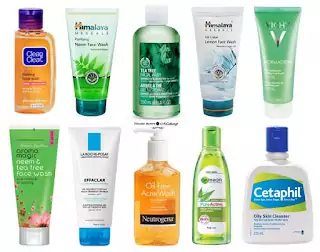It’s not an exaggeration to say that there are hundreds of facial washes on the market. And though the ingredients seem to vary from product to product, they all do just a few things: either hydrate skin, remove oils, kill bacteria or cleanse. Finding the face wash that works for you is based on your individual unique needs. Beauty Brains, a website founded by scientists in the cosmetic industry, suggests experimenting with different products until you find the right formulation that benefits your skin most.
Types of Face Washes
The basic goal of a face wash is to cleanse the skin. But there are a number of variables you need to consider before buying the right product. A face wash to prevent acne will contain the ingredient salicylic acid, which helps unclog pores in part by preventing cells from shedding too quickly. A cleanser with alpha-hydroxy acids will help exfoliate skin and remove dead skin cells and dirt, refreshing damaged skin. Washes with beta-hydroxy acids will fight acne on oily skin by exfoliating dead skin cells.
Ingredients in Face Washes
The types of active ingredients you’ll find in most face washes are salicylic acid, water, cetyl and stearyl alcohol, propylene glycol, and sodium lauryl sulfate. Salicylic acid washes dead skin cells and unclogs pores. Cetyl and stearyl alcohol bind with oil on the skin to wash it away. Propylene glycol helps moisturize and sodium lauryl sulfate is a cleanser.
Most of the ingredients listed on a product’s label are used to preserve the ingredients after you open the bottle and allow the different chemicals to blend.
Importance of Cleansing Skin
Even if you do not have problematic skin conditions like acne, dryness or excessive oil production, it’s important to wash your face daily. Microscopic bacteria can still get into pores and cause breakouts. And sebum production—oils created by the sebaceous glands—in the pores, increases during a woman’s menstrual cycle.
Skincare Products with Risks
There are some cosmetic ingredients that have been linked to skin problems, including acne breakouts. TruthInAging.com, an online cosmetic journal, warns that isopropyl myristate, used in cleansing and moisturizing washes, “should be used with caution by people with normal to oily skin since it is comedogenic (can cause breakouts) and may cause acne inflammation.”
At least a half a dozen other cosmetic ingredients, report the cosmetic scientists at Beauty Brains, work similarly to isopropyl myristate but don’t cause breakouts.
The effects of face wash should occur almost immediately. A study by the Urban Life Research Institute in Tokyo found that after washing, subjects had less sebum production for several hours.
For face washes used to hydrate or rid skin of excess oil, ingredients in face washes automatically bind to and wash away the molecules that cause oily and dry skin.
